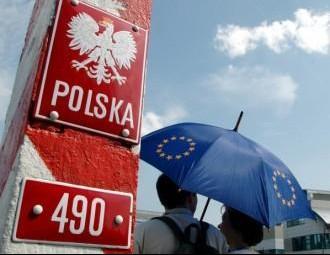Belarus wants to keep its western border locked shut

Last week a spokesperson for the Ministry of Foreign Affairs announced that Belarus was not ready to implement an agreement on local border traffic with Poland.
The reason given was ‘the anti-Belarusan position of the Polish government'. Although both sides have already signed the agreement and the parliaments ratified it in 2010, Minsk is clearly not in a hurry to implement it despite the clear potential benefits to its citizens.
Lithuania has a similar story to tell. In 2011 both the Lithuanian and Belarusan parliaments ratified an agreement, but it was destined to share the same fate as the Polish initiative. Perhaps Vilnius has more realistic chances of concluding such an agreement with Belarus than Poland does. Latvia was the first and the only country to manage to implement a local border traffic agreement with Belarus, in 2012.
Last week's announcement by the Belarusan Foreign Ministry could be another attempt to divide EU neighbours over Belarus. The regime may be worried that local border traffic with any EU country will open the door to the West for Belarusans.
History of the Belarus-Poland Agreement
The goal of the agreement is to facilitate the cross-border movement of people who live in an area up to about 30 km from the border. Instead of visas, a special document would prove the right to cross the border on a much more relaxed and cheaper basis.
The Polish initiative on local border traffic with Belarus dates back to 2008. Two years later both the Polish and Belarusan parliaments ratified the agreement. In 2010 the heads of each state, Aliaksandr Lukashenka and Bronislaw Komorowski, signed the document. Warsaw has officially declared its readiness to implement it.
However, the agreement seems to have remained in a stack on Lukashenka's desk. An exchange of diplomatic notes between Warsaw and Minsk remains the final missing stage. The recent message by the Ministry of Foreign Affairs makes clear to thousands of those living on both sides of the border that Minsk has no political will to deal with the issue in the near future.
Last October, Andrej Savynych sent a similar message regarding the future of local border traffic with Poland to the one received last week. "The politics of the Polish establishment in bilateral relations with Belarus creates a highly unfavourable climate" - he said, explaining the reasons for delay in the implementation of local border traffic on Belarus' side.
In his words, Poland's support for EU sanctions towards Belarus appeared to be the primary cause of Minsk's reaction. On the other occasion, the Belarusan consul in Bialystok said that in addition to the political motives, technical difficulties related to the lack of special printing devices were also hindering implementation of the procedure.
Cross-Border Reality: Trade is the Main Driver
As data from the Polish Ministry of Foreign Affairs shows, around 1.1 million Belarusans from the Hrodna and Brest regions might receive permission for non-visa movement. On the Polish side, implementation of such an agreement can benefit around 600,000 Poles. Looking at these figures only, Belarus would gain significantly more from implementing the agreement.
In addition, as the table below demonstrates, the overwhelming majority of those who cross the Belarus-Poland border do not have Polish passports. In other words, Belarusan citizens would benefit from simplification of cross-border movement much more than Poles.
Table 1. Crossing of the Belarus-Poland border in the fourth quarter of 2012.
|
Voivodeship |
Cross-Border Movement (thousands of People) |
|
|
Polish Citizens |
Foreign Citizens |
|
|
Lubelskie |
142,7 |
903,9 |
|
Podlaskie |
97,7 |
1116,8 |
Source: Poland's Central Statistical Office (2013)
Poland's Central Statistical Office reports that over two million Belarusans came to Poland last year. According to estimates of Poland's Customs Chamber, the majority of the foreigners who purchased consumer goods in Poland were Belarusans. Foreigners in the Belarus-Poland borderland claimed over 750,000 tax-free documents. A majority of them crossed the border in the Podlaskie region of Poland.
Both Belarusans and Poles cross the border mainly for shopping (82.5% of Poles and 73% of Belarusans). Consumer electronics, food, chemicals and fuel are the goods in highest demand. As has been true for many years, trade and business allow many in the borderlands to survive.
Opera Tickets in Exchange for Visas
Poland's institutions and businesses are clearly interested in seeing more Belarusan visitors. The Opera House in Bialystok sells tickets for musical performances to Belarusans in a package deal that includes a visa, accommodation in a hotel and a city tour. The price is cheaper than the cost of a tourist visa itself. According to the opera's director, Robert Skolimowski, 13,000 Belarusans have already booked tickets for this year's performances. The cultural element is important here as well, and can truly bring both nations closer together, but it serves another function too -- it contributes to Bialystok's budget.
Bialystok's local newspaper Wspolczesna notes that 'almost 2 million people on both sides of the border are waiting for it to go through'. Another Polish outlet, Poranny, reports on Sokolka, a town near the border, for which local border traffic appears to be crucial for more dynamic economic development of local businesses.
The queues in the Polish consulates in Belarus prove that many Belarusans have an interest in coming to Poland and going further West. Last year three Polish consulates issued 350,000 visas to Belarusans. Poland is overwhelmed with visa applications and Latvia has offered its support with issuing visas to Poland. Beginning on 18 March 2013, Belarusan citizens may also apply for Schengen visas to Poland at Latvian consulates in Belarus.
Certainly, the absence of easier means of crossing the Belarus - Poland border efficiently hinders the development of these border regions. But for now the population of the border regions in Poland and in Belarus remain hostages of high-level politics.
-
03.01
-
07.10
-
22.09
-
17.08
-
12.08
-
30.09










































